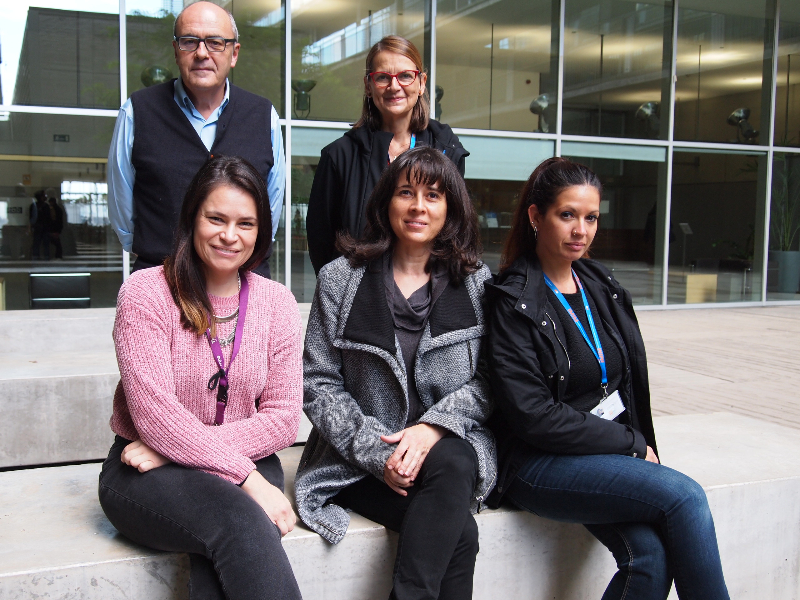
02/12/2021 - Press release
A study using mice shows that animals fed a diet rich in beneficial live microorganisms suffer less from the addictive effects of alcohol consumption. The work has been published in the journal Frontiers in Nutrition. It is the first to analyse the possible relationship between intestinal bacteria and the possibility of altering addictive behaviours related to alcohol use. In the study, animals that maintain a healthy microbiota also avoid addiction relapse and have lesser effects from associated disorders such as depression and anxiety.
Maintaining a healthy gut microbiota reduces the harmful effects of addictive alcohol use, according to a study by the Integrated Pharmacology and Systems Neuroscience Research Group at the Hospital del Mar Medical Research Institute (IMIM-Hospital del Mar) and the CIBER on the Physiopathology of Obesity and Nutrition (CIBEROBN), which has just been published in the journal Frontiers in Nutrition. The work, funded by the Ministry of Health's National Plan on Drugs, is the first to establish a direct link between bacteria living in the gut, the brain, and addictive behaviour. The gut microbiota sequencing was carried out by Microomics Systems, SL.
The researchers used mice to determine the relationship between alcohol intake and the gut microbiota, which is now considered to be another of the body's organs. In this case, over several weeks, one group of animals was given supplements containing a mixture of prebiotics and probiotics, a symbiotic, to stimulate the growth of beneficial bacteria in their gut, while another group, the control group, was fed a conventional diet. All the animals were then subjected to intermittent exposure to alcohol for 20 days, alternating between alcohol and the symbiotic, or water in the case of the control group. At the end of this period, the alcohol supply was stopped for seven days, and the animals were offered alcohol again to see if there was a consumption relapse.

Back standing: Rafael de la Torre and Patricia_Robledo. In front from left to right: Elk Kossatz, Neus Pizarro and Emma Veza.
Bacterial protection
The results of the tests show that in animals which received prebiotics and probiotics with their diet there was a lower escalation of alcohol consumption. In addition, relapse after cessation of alcohol intake was lower. According to Dr. Patricia Robledo, a researcher at the IMIM-Hospital del Mar and first author of the study, this shows that "Implementing a diet rich in probiotics can prevent addictive behaviour related to chronic alcohol consumption, since their ingestion produces changes in the intestinal microbiota and certain neurotransmitters in the brain." In other words, the study "explored whether modulating the gut-brain axis (the two-way communication system between the gut microbiota and the brain) could prevent alcohol-related disorders", she says.
At the same time, the animals were subjected to behavioural studies to measure the alterations associated with alcohol addiction. This revealed that females suffered depression, anxiety and memory alterations, but this was reduced in those with reinforced gut microbiota. Finally, neurotransmitters including serotonin, dopamine and noradrenaline were measured in the brains of the animals, showing that their levels in the prefrontal cortex and hippocampus (areas related to addictive behaviours, depression, anxiety and memory) were affected differently depending on the state of the gut microbiota. The study therefore demonstrates that "Modulating the intestinal microbiota can have an impact on addictive behaviour", indicates Dr. Neus Pizarro, one of the authors of the study and also a researcher at IMIM-Hospital del Mar, who states that "What is achieved with the symbiotic is a reduction in the adverse effects of alcohol on the composition of the intestinal microbiota, thus avoiding its repercussions on the brain."
In any case, eating a diet rich in prebiotics and probiotics "is not a magic pill against the possibility of suffering addictive behaviour", says Dr. Rafael de la Torre, coordinator of the Integrated Pharmacology and Systems Neurosciences Research Group at IMIM-Hospital del Mar and a CIBEROBN researcher. In fact, alcohol consumption causes an imbalance in the microorganisms that live in the intestine. For that reason, "If we modulate the intestinal microbiota, the changes can be reflected in the brain over the medium and long term. But under no circumstances can the symbiotic be considered a kind of morning-after pill for addictive behaviour", he adds.
Reference article
Nieves Pizarro, Elk Kossatz, Pedro González, Alba Gamero, Emma Veza, Cristina Fernández, Toni Gabaldón, Rafael de la Torre and Patricia Robledo. Sex-specific effects of synbiotic exposure in mice on addictive-like behavioural alterations induced by chronic alcohol intake are associated with changes in specific gut bacterial taxa and brain tryptophan metabolism. Front. Nutr. 2021
© Institut Hospital del Mar
d'Investigacions MèdiquesLegal Notice and Privacy Policy | Cookie Policy | Site Index | Accessibility | Find Us | Contact